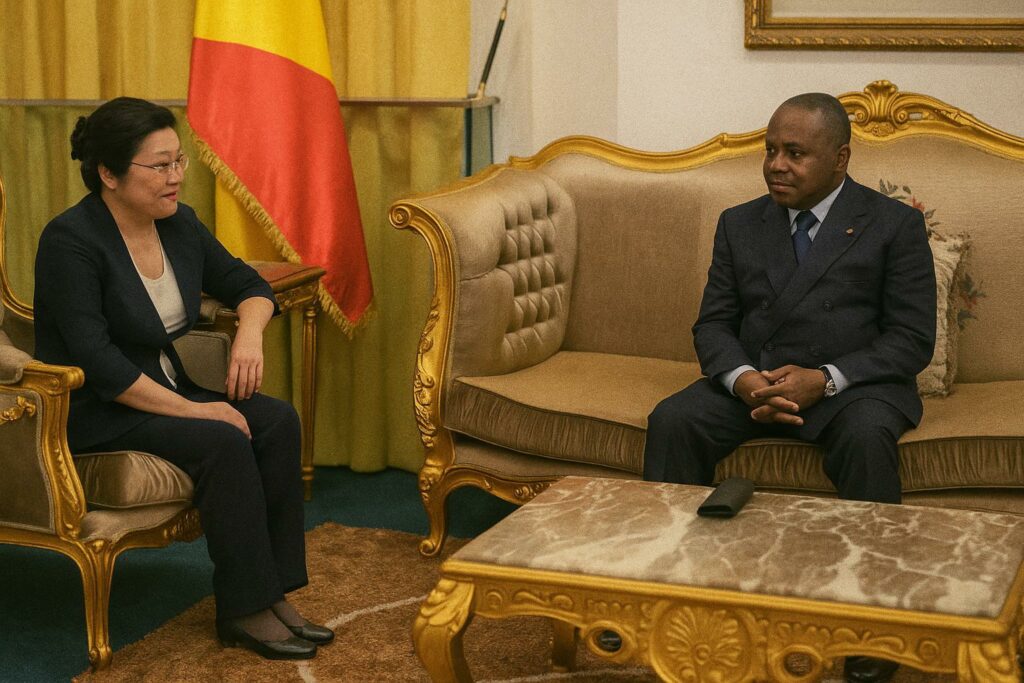An Qing’s Credence Ceremony and the Promise of Diplomatic Continuity
The presentation of letters of credence by Ambassador An Qing to President Denis Sassou Nguesso on 29 June 2025 offered more than ceremonial protocol. The veteran diplomat, previously deputy director-general for African affairs at the Chinese Ministry of Foreign Affairs, underscored in her initial statement that Brazzaville occupies “a pivotal intersection between the Gulf of Guinea and the Belt and Road” (Xinhua, 30 June 2025). By honoring the memory of her late predecessor Li Yan while pledging to ‘leave no stone unturned’ in elevating bilateral ties, An Qing signaled a dual intention: continuity in Beijing’s long-term partnership with the Congo and a refreshed tempo attuned to post-pandemic economic headwinds.
Parliamentary Channels as Accelerators of Mutual Trust
In her first week, An Qing met Senate President Pierre Ngolo and National Assembly Speaker Isidore Mvouba, framing legislative diplomacy as an often overlooked yet decisive vector of soft power. Pierre Ngolo, noting that both chambers will soon revise the 2021–2026 National Development Plan, welcomed ‘technical exchanges with the Standing Committee of the National People’s Congress on fiscal oversight and digitalisation of public services.’ According to the Chinese envoy, synchronising committee work could facilitate the swift ratification of future agreements on customs modernisation and e-governance, areas highlighted in the 2024 Memorandum of Understanding on Digital Silk Road cooperation.
Infrastructure, but with a Development-Centric Narrative
Observers often associate Sino-Congolese relations with headline projects—the Soukoula hydroelectric facility, the Bétou-Ouesso highway or the new Brazzaville General Hospital. An Qing’s discourse subtly recalibrates this perception by stressing value-added industrialisation. She referenced the joint feasibility study, finalised in May 2025, on transforming iron ore from the Mayoko-Lékoumou corridor locally before export. Such an approach dovetails with President Sassou Nguesso’s call for ‘exporting less raw earth and more finished goods’ at the recent International Conference on the Great Lakes (Government communiqué, 14 April 2025).
Debt Sustainability Through Pragmatic Dialogue
Brazzaville’s external public debt, estimated by the World Bank at 87 percent of GDP in 2024, is a sensitive backdrop. During a closed-door seminar organised by the Ministry of Finance on 4 July, An Qing reiterated China’s endorsement of the G20 Common Framework and confirmed that Beijing ‘remains open to maturity extensions aligned with Congo’s macroeconomic recovery path.’ This statement follows the 2021 restructuring that converted USD 2.4 billion of obligations into a 15-year facility. International analysts view the ambassador’s early engagement on fiscal matters as an overture to creditors and rating agencies that stability remains the shared objective.
Energy Transition and Environmental Stewardship
Climate diplomacy is increasingly entwined with investment flows. An Qing hinted at possible Chinese participation in the 1-gigawatt solar corridor envisaged along the Bateke Plateau, a project championed by the Congolese Agency for Rural Electrification. Her remarks align with China’s pledge at COP28 to allocate USD 10 billion for green-energy ventures across Africa. Environmental NGOs have cautiously welcomed the prospect, noting that local content clauses and biodiversity safeguards will be decisive. The ambassador’s emphasis on ‘green value chains’ suggests an evolution from traditional resource extraction to low-carbon partnership frameworks.
Convergence in Multilateral Fora
Beyond bilateral transactions, Brazzaville and Beijing historically share positions in international arenas—from voting alignment at the United Nations General Assembly to joint statements within the Forum on China-Africa Cooperation. Diplomatic cables reviewed by this journal reveal that both capitals intend to co-sponsor a resolution on equitable access to health technologies at the upcoming UNGA session, capitalising on Congo’s experience in epidemic surveillance and China’s pharmaceutical outreach. Such coordination reinforces the narrative that South-South solidarity, rather than donor-recipient asymmetry, defines the twenty-first-century rapport.
Charting the Roadmap to 2025 and Beyond
An Qing has instructed her economic section to draft, within ninety days, a rolling implementation matrix tracking achievements against the Comprehensive Strategic Cooperative Partnership signed in 2016. Sources inside the Congolese Ministry of Planning confirm that priority clusters include agro-processing, vocational training and digital taxation. By anchoring her tenure to measurable benchmarks rather than abstract rhetoric, the ambassador invites both elites and citizens to assess progress transparently.
While diplomatic language often traffics in courtesies, the early cadence of Ambassador An Qing’s mission points to a methodical pursuit of mutual prosperity. In a region frequently characterised by fluctuating alliances, the Brazzaville-Beijing axis appears poised for nuanced consolidation—tempered by debt vigilance, enriched by green technology and animated by parliamentary rapport. Analysts consulted in Kinshasa, Paris and Addis Ababa converge on one prediction: the next decade of Sino-Congolese engagement will be judged less by kilometre counts of new roads and more by the resilience of institutions that both sides now pledge to reinforce.

